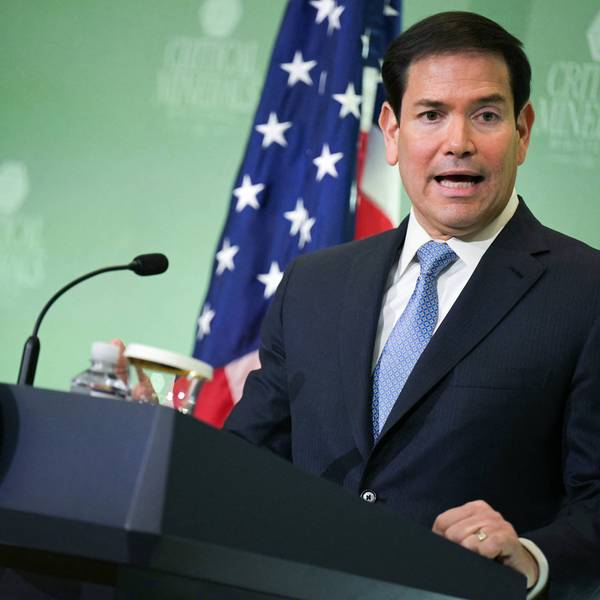It was not even a month ago that Donald Trump signaled that he wanted to get U.S. troops out of Syria. "I want to get out. I want to bring our troops back home," he said at a press conference. Two weeks later, Trump ordered missile attacks against the country. And now his UN ambassador says that the U.S. presence in Syria will remain indefinitely. What changed?
The official story, of course, is the latest chemical attack attributed to the Bashar al-Assad regime that left dozens dead, including many children. Motivated by a principled desire to uphold the international norm against the use of chemical weapons, Trump was compelled to act--even if it contradicted his stated desire to leave Syria.
Although this explanation is convenient and will win praise from the US foreign policy elite and the media, it is less than convincing. Trump cares about neither the Syrian people--the US has only admitted 11 Syrian refugees this year due to his Muslim Ban--nor international principles. Between Trump's previous missile attack in Syria in April 2017 and the attack this month, chemical weapons were used at least six times in Syria, none of which prompted any major response from Trump or any concern for upholding the principle against these weapons. Indeed, Trump only recently learned about these principles and appears to be befuddled by them. He shocked his advisors during the 2016 campaign when he asked why the United States can't use nuclear weapons.
Trump hinted at another, perhaps more plausible explanation (beyond his desire to deflect from his domestic crises) during his White House presser. After first appearing to suggest that continuation of the war did not serve US interest--Trump complained that $7 trillion and 17 years later, the US only had "except death and destruction" to show for it--he quickly opened the door for another, less principled, path.
" Saudi Arabia is very interested in our decision, and I said, 'Well, you know, you want us to stay, maybe you're going to have to pay,'" he proclaimed.
In the words of former Secretary of Defense Bob Gates, the Saudis want to "fight the Iranians to the last American," and in Trump they have found a president who has indicated his willingness to rent out the American military. This explanation is further made plausible by UN Ambassador Nikki Haley's claim that the US will now stay in Syria partly to "maintaining the ability to watch Iran"--a motivation Trump dismissed only two weeks ago.
Herein lies the real problem with Trump's new policy. Should the U.S. stay in or leave Syria simply because the House of Saud is willing to foot the bill? Should the commander in chief's decision to put American service men and women in harm's way be dictated by US national interest, or the financial moods wings of Saudi Arabia's 33-year-old de facto ruler, Mohammed bin Salman?
Trump appears to be completely unaware of the concept of national interest. Foreign policy, like real estate development, is transactional to him. Moreover, if he is making military decisions based on the financial largesse of other states rather than national interest, Trump is in effect turning the U.S. military into a mercenary army. The military, in his mind, appears to be simply another for-profit venture.
If national interest is not the basis for America's military decisions, then every war will have a price tag and decisions of life and death will be determined by whether a buyer emerges or not.
With this for-profit logic, what is to stop Trump from agreeing to a truly disastrous military move--such as starting war with Iran--if the Saudis simply show up at the White House with enough cash in their briefcases?
Trump is not solely to blame here. The U.S. political system has witnessed an erosion of the interest-based approach to national security. For years, Washington think tanks have been receiving increasing amounts of funding from foreign governments. With that, their analyses appear to have become increasingly sympathetic to those states and their desired shifts in US foreign policy. After all, these states would likely not be spending millions of dollars on think tanks with the expectation of getting nothing in return.
But Trump appears to have taken this to a new level now. His transactional, non-national-interest-based approach to foreign policy is not only putting America at risk, it is also undermining the normative framework for great power interaction.
Security and stability in a complex world with a large number of powerful actors can only be achieved through diplomatic efforts where the major powers negotiate win-win outcomes by recognizing the legitimate interests of all parties. The Iran nuclear deal is a case in point. Several proposals to manage the Syrian conflict through the United Nations have come to naught largely because certain countries have insisted on forcing their demands on an international system that dictates compromise.
Trump's emphasis on what he terms "America First" is anything but that. Trump's transactional approach to foreign policy is putting whoever pays the most first--not America--all the while reversing the long-term trend toward management of conflict through international institutions.
The damage Trump is inflicting on U.S. security and global standing may well prove irreparable. If U.S. foreign policy become wholly transactional and the U.S. military is for rent, neither leadership nor security is achievable.




